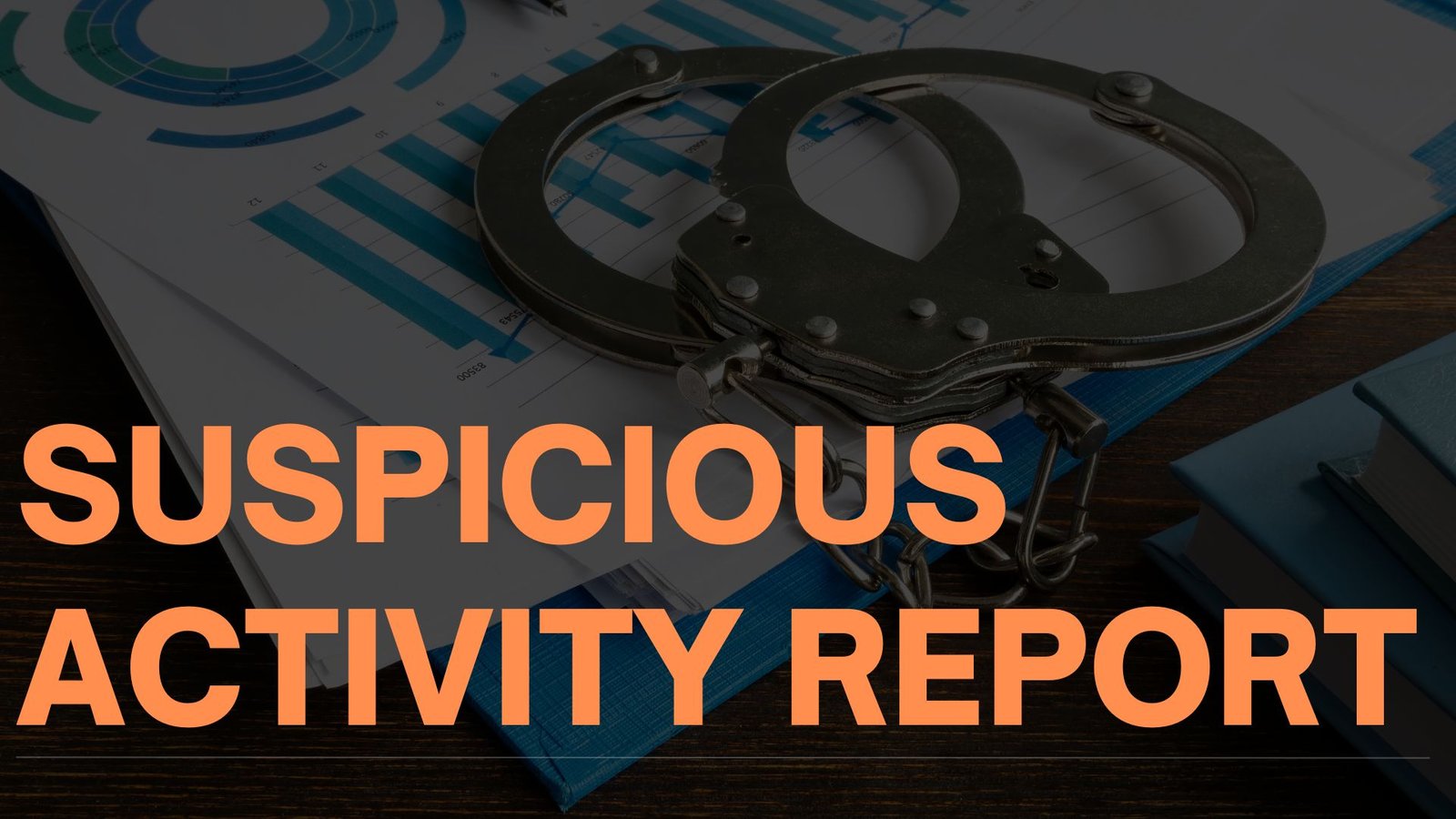On this page you will read detailed information about Suspicious Activity Report.
As a professional in the financial industry, you have an important responsibility to file Suspicious Activity Reports (SARs) when warranted. This 100-word article provides an overview of what a SAR entails, when one should be filed, how to complete the process properly, and what happens after submitting these confidential documents to the appropriate authorities. Gaining a working knowledge of the SAR system allows you to uphold your legal and ethical obligations in detecting and reporting potential criminal abuses of the financial system.
What Is Suspicious Activity Report (SAR)?
A Suspicious Activity Report (SAR) is a report that financial institutions like banks file with the U.S. government regarding questionable customer transactions that could potentially indicate money laundering, tax evasion, fraud, or other illegal financial activities. SARs are filed with the Financial Crimes Enforcement Network (FinCEN), a bureau of the U.S. Department of the Treasury.
Banks and other financial institutions are required by law to file a SAR if they detect unusual or suspicious activity in a customer’s account that might indicate illegal activity. Some examples of transactions that could trigger a SAR include:
- Large cash deposits or withdrawals totaling $10,000 or more
- Wire transfers to or from foreign countries
- Sudden increased activity in previously dormant accounts
- Transactions that do not match the customer’s known income or activities
When a financial institution files a SAR, they provide details about the suspicious transactions, including the dates, amounts, accounts, and parties involved. The SAR also includes information about the customer like their name, address, date of birth, social security number, and occupation.
FinCEN uses the data from SARs to detect and prevent financial crimes. The information is analyzed to identify patterns that could indicate money laundering or terrorist financing. Law enforcement agencies can then use the data from SARs during investigations into financial crimes and illegal activities.
SARs are confidential and financial institutions are prohibited from disclosing to the customer that a SAR has been filed. This is to avoid compromising ongoing law enforcement investigations or alerting criminals that their illegal activities have been detected. However, customers do have the right to request any documents related to their account, including SARs. But the financial institution must first consult with the appropriate law enforcement agencies before disclosing a SAR to the customer.
In summary, SARs play an important role in combating financial crimes and protecting the integrity of the financial system. Although the reporting process can seem invasive, SARs have been shown to be an effective means of detecting and preventing illegal money laundering and other fraudulent activities.
In the previous post, we had shared information about Tort vs Breach of Contract: Key Differences You Should Know, so read that post also.
When Banks Must File a SAR
Banks and other financial institutions are required by law to file a Suspicious Activity Report (SAR) with the Financial Crimes Enforcement Network (FinCEN) in certain situations. As a bank customer, it is important to understand when and why a bank may file a SAR related to your accounts or transactions.
Large Cash Transactions
Banks must file a SAR for any cash transaction over $10,000. This applies to deposits, withdrawals, exchanges of currency, or other payments or transfers. The SAR helps authorities monitor transactions for signs of money laundering or other illegal activity. For normal business or personal cash transactions, the customer should be prepared to provide documentation and details to the bank regarding the origin or purpose of the funds.
Suspected Criminal Activity
Banks will file a SAR if they suspect that funds or transactions in an account are derived from illegal activity or are intended to hide the source of funds derived from illegal activity. Examples include transactions that appear structured to avoid reporting requirements, layering of transactions without business purpose, unexplained wire transfers, or other signs of money laundering. The bank is obligated to report suspicious transactions even if they are not able to definitively prove illegal activity.
Fraudulent Transactions
Transactions that show signs of fraud, embezzlement, check kiting, or other scams will trigger the filing of a SAR. This includes unauthorized access to funds, forged signatures, or identity theft. Banks aim to detect and prevent loss due to fraud, so suspicious transactions are monitored closely. Once fraud is detected, a SAR is filed with details of the suspicious transactions and accounts involved.
Banks take their responsibility to monitor accounts and report suspicious activity very seriously. While the filing of a SAR does not necessarily mean illegal activity has occurred, customers should be aware of transactions and account activity that could trigger the filing of a report. Maintaining open communication with your bank and being prepared to provide documentation for certain types of transactions are good practices.
Examples of Suspicious Activities to Report
Large cash transactions, especially those over $10,000, should be noted. Businesses are required to report cash transactions over $10,000 under the Bank Secrecy Act. If an individual conducts multiple cash transactions below the $10,000 threshold over a short period of time in an apparent attempt to avoid reporting requirements, this behavior may indicate illegal activity and should be reported.
Money laundering involves concealing the origin of funds obtained illegally. Signs of money laundering include customers making large deposits, immediate withdrawals of recently deposited funds, or frequent transfers between accounts. Accounts being used for business when the customer has no known business are also suspicious.
Identity theft happens when someone uses another person’s personal information to commit fraud or other crimes. Be wary of customers opening new accounts with another person’s information, taking over existing accounts, or abruptly changing the contact details for an account. Unauthorized access or theft of customer data should also be reported promptly.
Terrorist financing provides funds intended to support terrorist acts or terrorist organizations. Look for donations to non-profit organizations with names similar to well-known terrorist groups. Cash payments, anonymous wire transfers, and other untraceable methods of transferring money are also causes for concern, especially when the transaction details provided seem implausible.
If any transaction, activity, or piece of information gives you reason to suspect illegal or unethical activity may be occurring, it is best to report it to the appropriate authorities. When in doubt, report it using a Suspicious Activity Report. By reporting suspicious financial activities, you can help prevent serious crimes and ensure a safer financial system for all.
What Happens After a SAR Is Filed
Once a SAR has been filed with an authority like FinCEN, the following generally occurs:
The SAR is reviewed by analysts to determine if it requires further investigation or if it contains elements that match other reports.
Investigation
If deemed necessary, the SAR may be investigated further. As part of an investigation, authorities may:
- Interview the individual who filed the SAR as well as any employees involved in the reported transactions.
- Review security footage, transaction records, customer information, and other data related to the suspicious activity.
- Monitor accounts and transactions to detect ongoing or future suspicious behavior.
- Coordinate with other government agencies or financial institutions.
The investigation aims to determine if illegal activity has occurred or is ongoing. If so, the information from the SAR and subsequent investigation may be used as evidence for potential legal action.
Information Sharing
Details from the SAR and any related investigations may be shared with appropriate law enforcement and government agencies to aid in detection and prevention of financial crimes. Information may also be shared with certain financial institutions to help strengthen anti-money laundering (AML) programs and fraud detection systems.
No Further Action
If an investigation does not yield any evidence of illegal activity, the case may be closed with no further action taken. However, the details of the SAR remain on file and may be revisited if new suspicious information comes to light or as part of future data analysis.
Filing a SAR is an important step in combating money laundering, terrorist financing, and other financial crimes. By reporting suspicious activity, you are playing a role in helping authorities gain a more complete view of potential illegal behavior and take appropriate action.
SAR Frequently Asked Questions (FAQs)
If you suspect illegal or suspicious financial activity, you may need to file a Suspicious Activity Report (SAR). Here are some common questions about SARs:
A SAR is a report filed by financial institutions to report suspicious transactions that may involve money laundering, terrorist financing, or other illegal activities. SARs are filed with the Financial Crimes Enforcement Network (FinCEN), a bureau of the U.S. Department of the Treasury.
In the U.S., banks, money services businesses, broker-dealers, mutual funds, insurance companies, casinos, and other financial institutions are required by law to file SARs. Employees at these institutions, such as tellers, compliance officers, and fraud investigators, are typically responsible for identifying and reporting suspicious transactions.
You must file a SAR when a transaction involves or aggregates funds or other assets of at least $5,000, and you know, suspect, or have reason to suspect that the transaction involves funds derived from illegal activity or is intended or conducted to hide or disguise funds or assets derived from illegal activity. Some examples of suspicious transactions include cash payments, wire transfers to high-risk countries, shell companies, and structuring.
SARs must be filed electronically through the BSA E-Filing System. The report includes details about the suspicious transaction such as names, addresses, and transaction amounts. SARs should be filed as soon as possible, but no later than 30 days from the initial detection of facts that may constitute a basis for filing a SAR. Strict confidentiality must be maintained – it is illegal to disclose that a SAR has been filed.
Failure to file a SAR can result in civil and criminal penalties, including fines and imprisonment. Financial institutions can face severe penalties including large fines and damage to their reputation. Employees who fail to file a required SAR may face disciplinary action, termination of employment, and even personal fines and imprisonment.
Conclusion
As you can see, Suspicious Activity Reports play an important role in the financial system, helping to detect and prevent money laundering and other illegal activities. While filing a SAR may seem like an inconvenience, by following proper protocols and reporting any suspicious transactions, you are contributing to the integrity of the financial sector. Your due diligence helps ensure that financial institutions are not used for illicit purposes. By understanding what constitutes suspicious activity and when to file a SAR, you uphold ethical practices that create transparency and accountability across the industry. We all have a shared duty to prevent criminal exploitation of the financial system.
Disclaimer
The information and services on this website are not intended to and shall not be used as legal advice. You should consult a Legal Professional for any legal or solicited advice. While we have good faith and our own independent research to every information listed on the website and do our best to ensure that the data provided is accurate. However, we do not guarantee the information provided is accurate and make no representation or warranty of any kind, express or implied, regarding the accuracy, adequacy, validity, reliability, availability, or completeness of any information on the Site. UNDER NO CIRCUMSTANCES SHALL WE HAVE ANY LIABILITY TO YOU FOR ANY LOSS OR DAMAGE OF ANY KIND INCURRED AS A RESULT OR RELIANCE ON ANY INFORMATION PROVIDED ON THE SITE. YOUR USE OF THE SITE AND YOUR RELIANCE ON ANY INFORMATION ON THE SITE IS SOLELY AT YOUR OWN RISK. Comments on this website are the sole responsibility of their writers so the accuracy, completeness, veracity, honesty, factuality and politeness of comments are not guaranteed.
So friends, today we talked about Suspicious Activity Report, hope you liked our post.
If you liked the information about Suspicious Activity Report, then definitely share this article with your friends.








